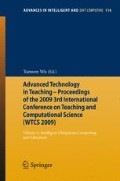Abstract
Affective computing is integrated on artificial emotions and intelligent computing. It attempts to recognize and synthesize human emotion to make intelligent response system. The research of affective computing is primarily involved in artificial emotion and artificial digital technology of cognition and consciousness. This paper introduces the background of affective information processing and discusses its main research branches and status. Based on affective computing and network technology, it proposes the realization method and key technology of the network service platform model. The system can solve the interactive problem of communication between users and machine effectively. At last, it presents some scientific problems waiting to be resolved in the future and proposes some suggestions.
Access this chapter
Tax calculation will be finalised at checkout
Purchases are for personal use only
Preview
Unable to display preview. Download preview PDF.
References
Damasio, A.R.: Descartes Error: Emotion, Reason and the Human Brain. Gosset/Putnam Press, NewYork (1994)
Takamura, H., Inui, T., Okumura, M.: Extracting semantic orientations of words using Spin Model. In: Proc. of the 43rd Annual Meeting of the ACL, pp. 133–140. ACL, Stroudsburg (2005)
Gratch, J.: A domain-independent framework for modeling emotion. Journal of Cognitive Systems Research 4(5), 269–306 (2004)
Picard, R.W.: Affective Computing. MIT Press, London (1997)
Slomana: Beyond shallow models of emotion. Cognitive Processing 2(1), 177–198 (2001)
Turney, P., Littman, M.: Measuring praise and criticism: inference of semantic orientation from association. ACM Trans. on Information Systems 21(4), 315–346 (2003)
Christos, H.P.: Computational Complexity, pp. 50–60. Addision-Wesley, New York (1994)
Wang, Z., Zhao, Y.: An Expert System of Commodity Choose Applied with Artificial Psychology. IEEE International Conference on Systems, Man and Cybernetics, 2326–2330 (2001)
Brandstatter Decker, B., Ring, A.W.: Adaptive Finite-Element Mesh Generation for Optimization Problems. IEEE Trans. on Magnetics 38(2), 1017–1020 (2002)
Ward, R.D., Marsden, P.H.: Affective computing: problems, reactions and intentions. Interacting with Computers 16(4), 707–713 (2004)
Nahl, D.: Affective computing. Information Processing & Management 34(4), 510–512 (1998)
Wang, S., Chen, E., Li, J., et al.: Content-based interactive emotional image retrieval. Journal of Image and Graphics 6(10), 969–997 (2001)
Author information
Authors and Affiliations
Editor information
Editors and Affiliations
Rights and permissions
Copyright information
© 2012 Springer-Verlag Berlin Heidelberg
About this paper
Cite this paper
Chen, M., Guo, L., Tang, X., Xiao, L. (2012). The Research of Network Information Service Platform Based on Affective Computing. In: Wu, Y. (eds) Advanced Technology in Teaching - Proceedings of the 2009 3rd International Conference on Teaching and Computational Science (WTCS 2009). Advances in Intelligent and Soft Computing, vol 116. Springer, Berlin, Heidelberg. https://doi.org/10.1007/978-3-642-11276-8_24
Download citation
DOI: https://doi.org/10.1007/978-3-642-11276-8_24
Publisher Name: Springer, Berlin, Heidelberg
Print ISBN: 978-3-642-11275-1
Online ISBN: 978-3-642-11276-8
eBook Packages: EngineeringEngineering (R0)

